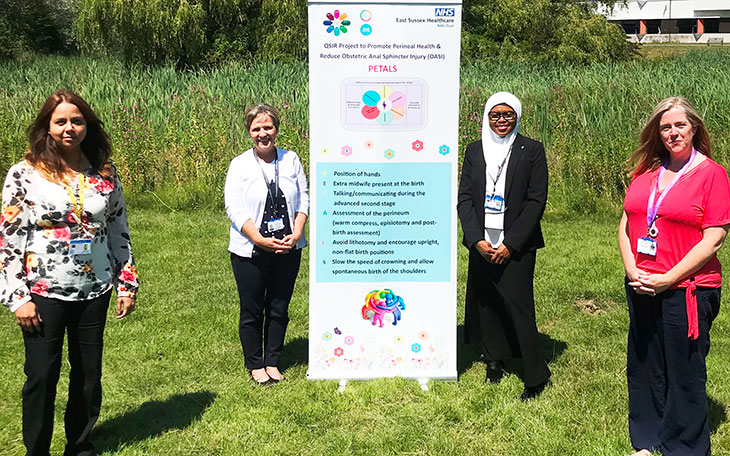Pregnant women are now able to access further support offered by the ‘PETALS’ project, to help them maintain their perineal health as well as prevent complications during birth.
The ‘PETALS’ project is a new multidisciplinary team of obstetricians, midwives, physiotherapists, gynaecological nurses and maternity support workers who promote perineal health for life and reduce the incidence of Obstetric Anal Sphincter Injuries (OASI) which can occur at birth.

Members of the ‘PETALS’ team
OASI injuries can lead to psycho-social problems, stress urinary incontinence, faecal and flatus incontinence as well as utero-vaginal prolapse. Miss Basirat Towobola, Consultant Obstetrician and Gynaecologist, said: “Pregnancy is a unique experience and welcoming a new baby is often a joyous and wonderful experience for the entire family. However, for some, there are unanticipated complications, which could manifest days, weeks, months or several years after a vaginal delivery.”
The PETALS project offers information about these possible complications and introduces strategies that have been designed to prevent or minimise them. These include patient information leaflets with links to videos to educate on antenatal physiotherapy to strengthen the pelvic floor muscles, perineal massage during pregnancy and techniques to help prevent anal sphincter injuries occurring during birth. There is also postnatal advice and physiotherapy information available.
Members of staff are being educated to practice the PETALS techniques and the aim is that a consistent approach is practised by the midwives and doctors at the point of birth to reduce the risk of an OASI. There is a follow up service to provide support and on-going treatment, if an OASI is unfortunately still sustained.
Jackie Longton, Deputy Consultant Midwife, said: “We’re delighted to launch the PETALS project and we hope this new initiative will have a positive impact. The project has been positively received by all members of the multidisciplinary team and as this is part of a Quality Service Improvement and Re-design (QSIR) project, and we will be closely monitoring the outcomes for women and staff to ensure the new process is making a difference.”
